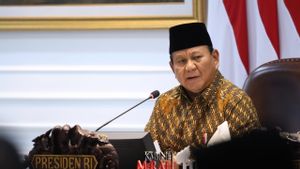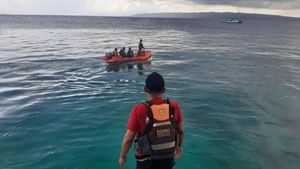JAKARTA - West Sumatra is one of the three regions ready to implement the new concept of normality. However, only Bukittinggi is eligible and in the near future it will implement the concept in the early COVID-19 period.
Head of West Sumatra Regional Police Public Relations Kombes Stefanus Satake Bayu Setianto said, based on the results of the regional level coordination and evaluation meeting, the implementation of the new normality concept in Bukittinggi on Saturday, May 30.
The application of the new concept of normality in Bukittinggi is based on careful consideration. The main factor, because the level of transmission in the area has decreased.
"The results of the meeting he (Bukittinggi, red) are most ready to carry out the new normal because the level (of spread, red) of COVID-19 has started a little. High evidence tomorrow will start (implement, red) new normal," said Stefanus in his statement, Friday, May 29. .
Meanwhile, for other districts or cities in West Sumatra, continued Stefanus, decided to continue to apply the concept of Large-Scale Social Restrictions (PSBB) until June 7, 2020.
Do not participate in dozens of regencies or other cities, because they have to improve community discipline first. Because if not, applying the new normality concept will only result in a higher number of COVID-19 infections.
"We see community discipline. The point is to improve it first and also while the PSBB is for the socialization of the new normal," said Stefanus.
Monitoring patternsIn implementing the new concept of normality in Bukittinggi, the West Sumatra Regional Police have prepared a monitoring and security scheme. Based on the results of the meeting, later the TNI and Polri will conduct regular routine patrols. The goal is to anticipate those who do not apply health protocols.
Then, a number of monitoring posts will also be established around economic and industrial centers. So, if there is an incident in an area, the officers who are closest to it will immediately go to the location to solve it.
"Later there will be guarding in new normal places. So there will be members who are on the one hand to prepare PAM in public areas where people gather in economic places. Later there will be PAM police there and the patrol system too," he explained. Stephen.
However, for the application of sanctions, said Stefanus, this is the last option. His party will put forward humanist methods in the form of socialization and warning. Both of these will be done continuously during the implementation of the new normal.
"What we put forward are continuous advice and socialization and doing humanist ways," concluded Stefanus.
Police RulesHead of the Public Relations Division of the National Police, Kombes Ahmad Ramadhan, said that in implementing the new concept of normality, the police will act decisively on people who do not prioritize health protocols during the pre-COVID-19 period. This is done when there is resistance from the community for an appeal from his party.
"Those who violate the rules or fight against the officers can be subject to Article 212 of the Criminal Code," Ahmad said in Jakarta, Thursday, May 28.
Article 212 of the Criminal Code contains people who ignore appeals from officers or oppose officers. The sanction in this article is a maximum of 1 year and 4 months of imprisonment or a maximum fine of IDR 4,500,000.
However, Ahmad emphasized that the provision of criminal sanctions is the last step that the police will take. This is because the apparatus will put forward a humanist and persuasive approach when monitoring the implementation of the new normality policy.
"The National Police prioritizes persuasive efforts to residents during the new normality," said Ahmad.
The application of this article is in accordance with the telegram letter number 249 dated May 28, 2020 in implementing the new normal scenario, in order to accelerate the handling of COVID-19 issued by the National Police Chief, General Idham Azis.
The contents of the letter instructed all staff to coordinate with relevant agencies in order to monitor new norms. Including being humane when monitoring and implementing regulations.
The English, Chinese, Japanese, Arabic, and French versions are automatically generated by the AI. So there may still be inaccuracies in translating, please always see Indonesian as our main language. (system supported by DigitalSiber.id)













